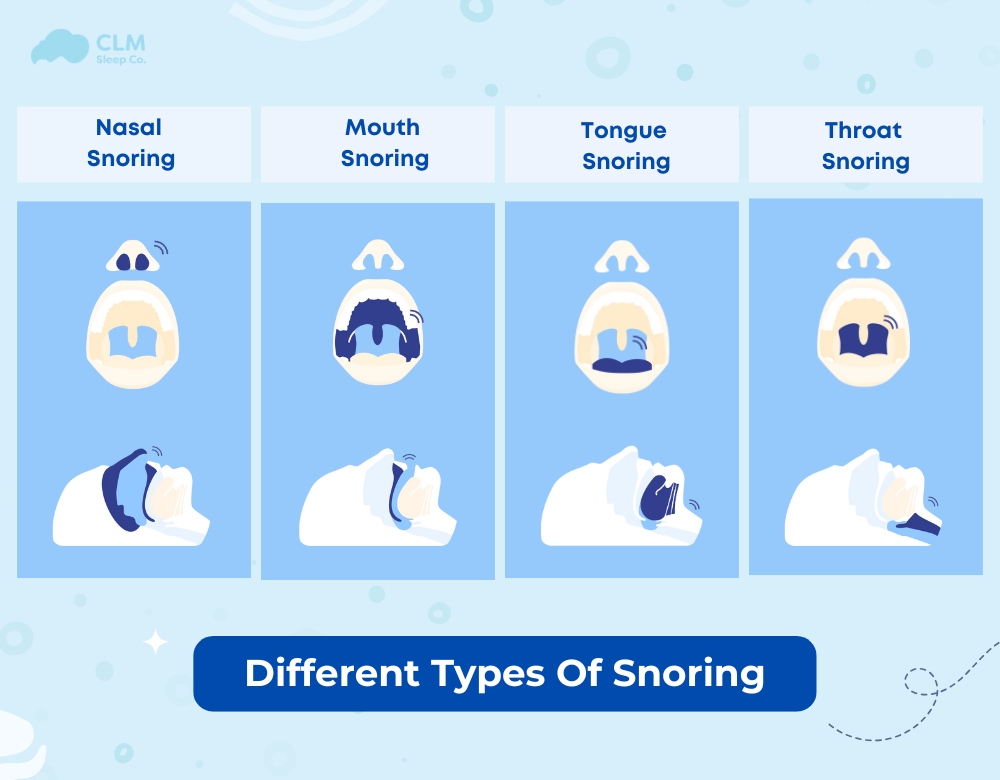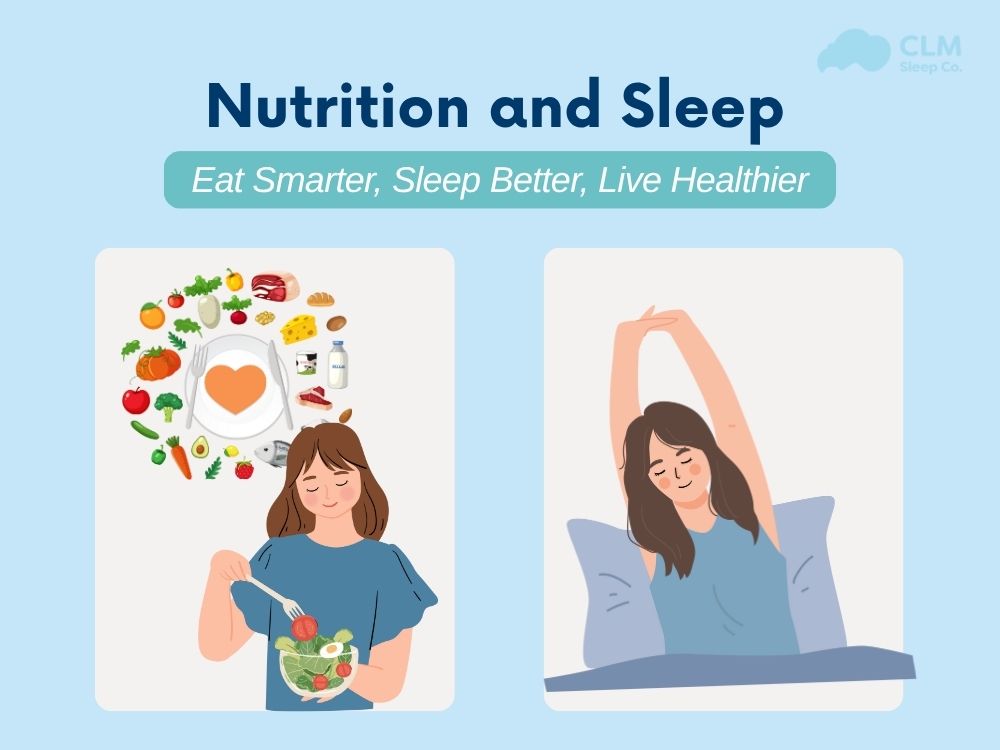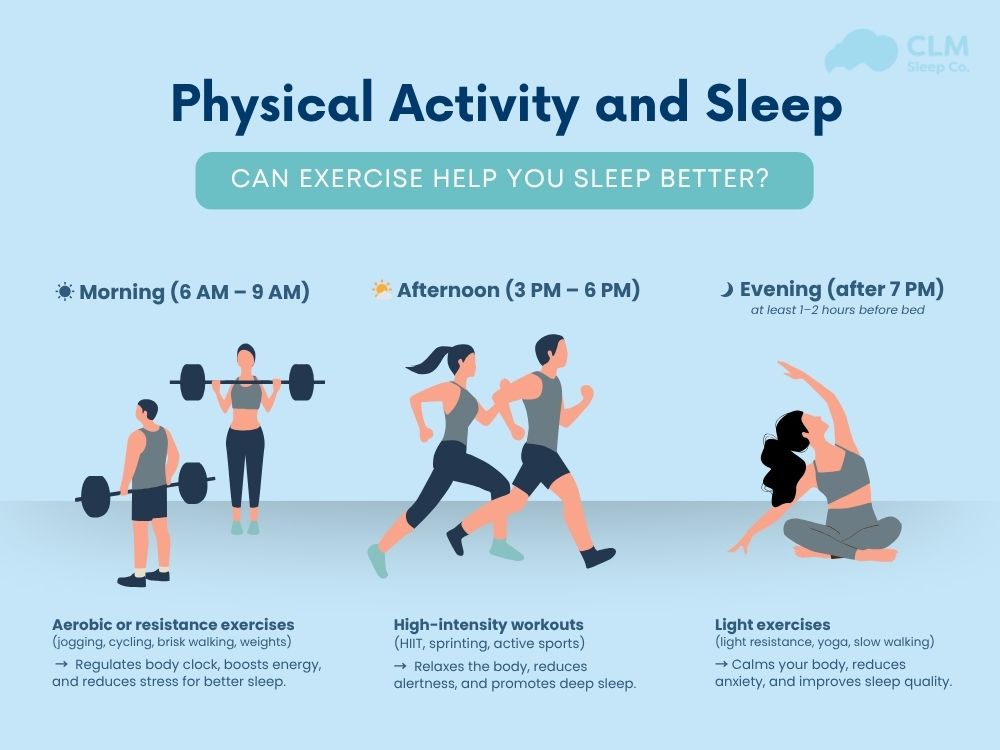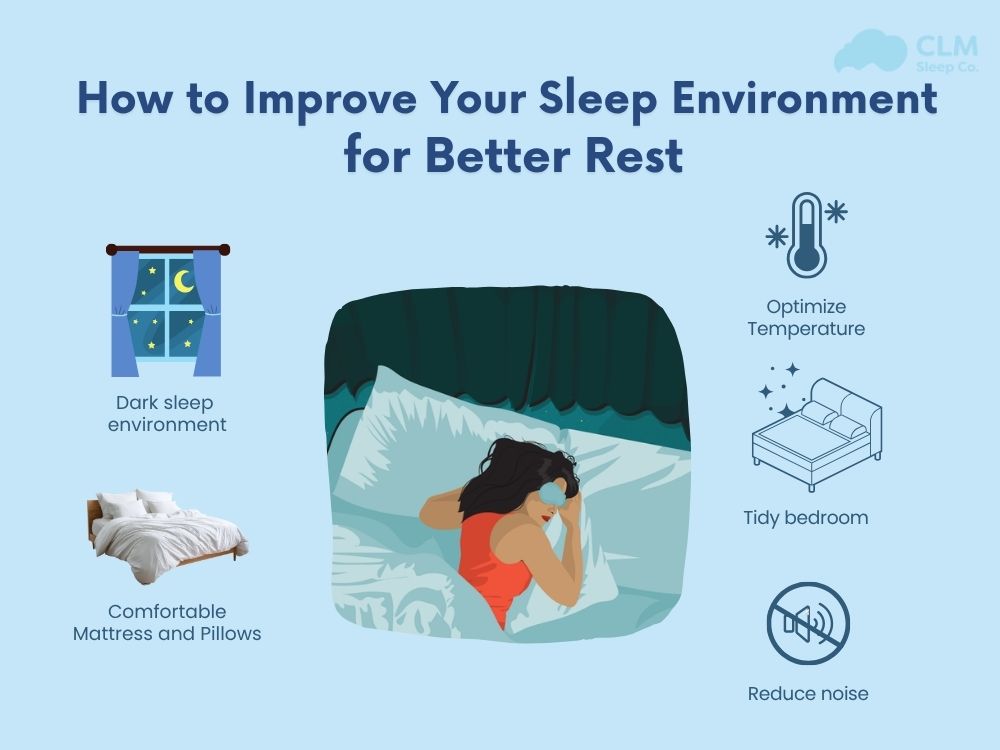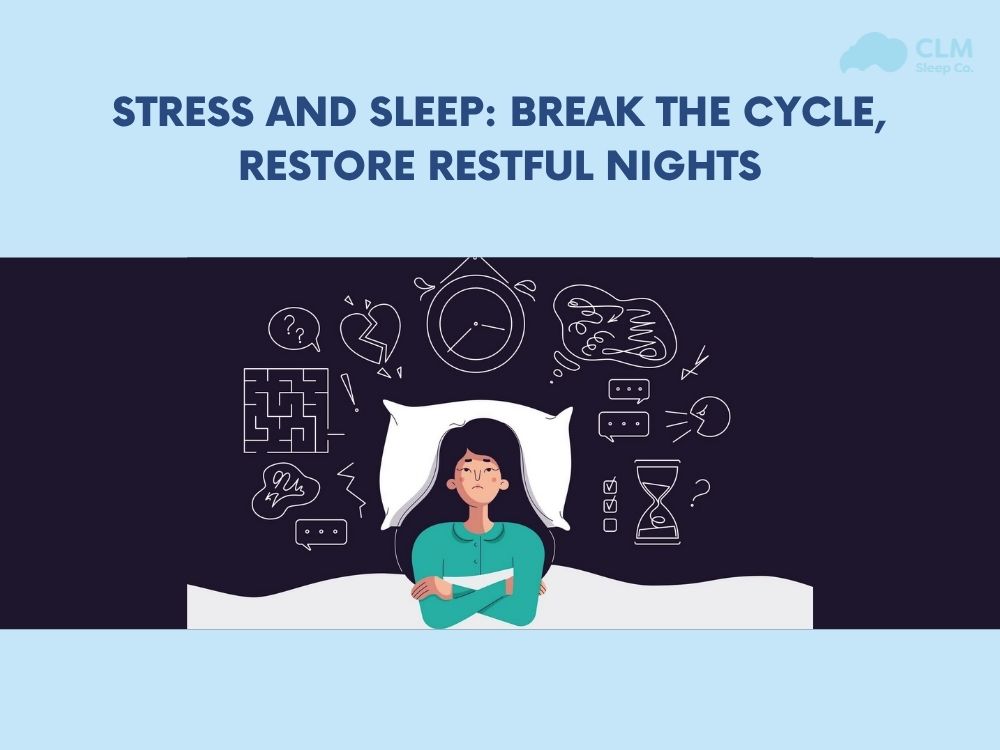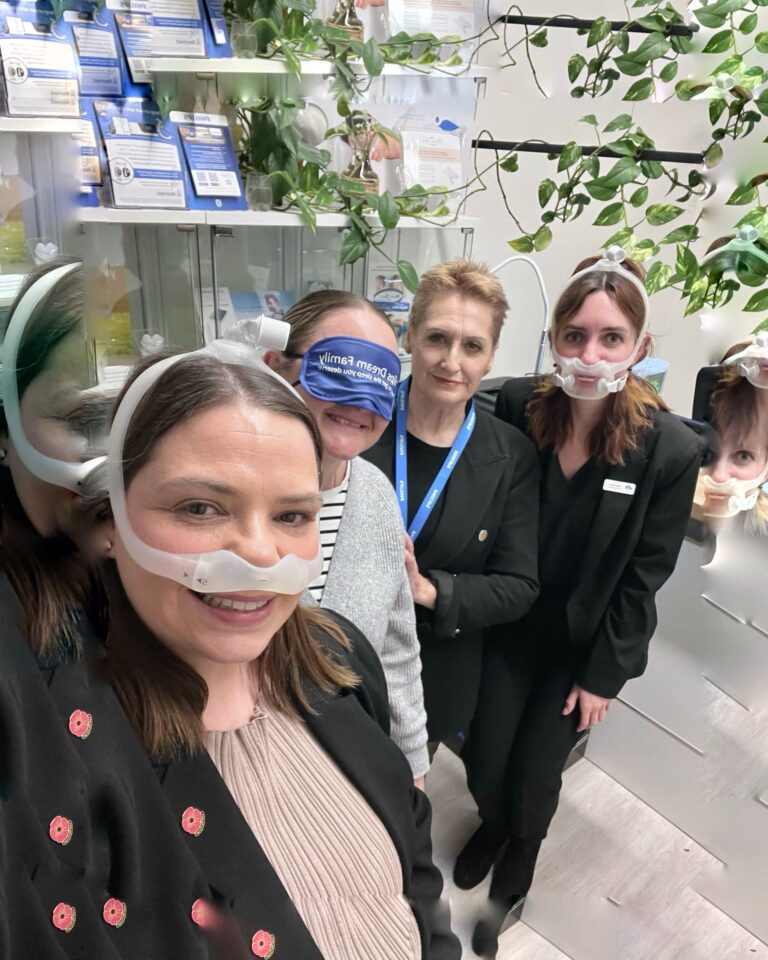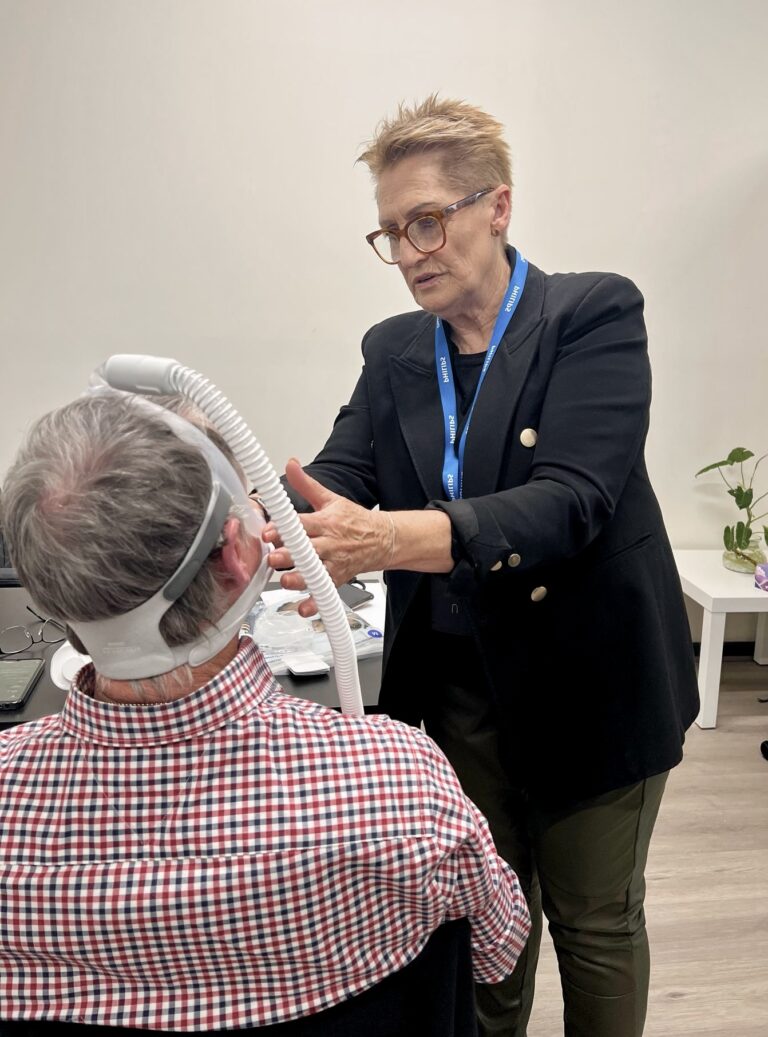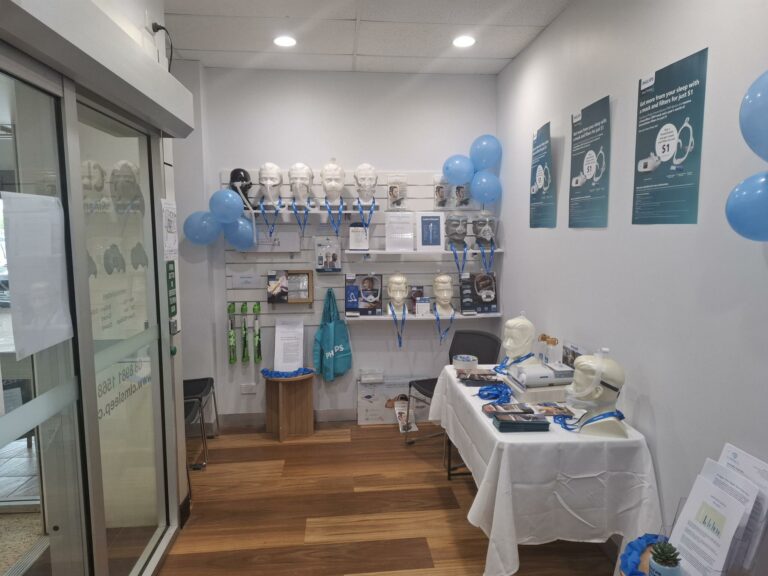Snoring is a common issue, but it’s often overlooked. Most people who snore and those around them consider it just a bad habit. However, sometimes it is a potential sign of some serious health conditions. Based on the sound and characteristics of snoring, you can often get a sense of its cause and how it may affect your health. Let’s explore the different types of snoring with CLM Sleep and see what kind of snoring you or your loved ones might be experiencing!
What is Snoring?
Snoring is the condition where sounds are produced from the nose or mouth while sleeping. This condition will disrupt the sleep of the snorer and those around them, causing fatigue, lack of energy, and lack of concentration during the day. At the same time, snoring affects brain function, increasing the risk of diseases such as sleep apnea, high blood pressure, and even cardiovascular diseases.
Why Do People Snore? Snoring occurs when the airway is partially obstructed, caused by the tongue and throat tissues narrowing the airway. Common causes of snoring can be nasal congestion, obesity, improper sleeping positions, or the influence of alcohol consumption. In addition, factors related to the structure, such as weak throat muscles, excess tissue in the pharynx, a soft palate, or an elongated uvula, can also cause this condition.
See more: Anti-Snoring Devices – Effective Solutions to Stop Snoring
Common Types of Snoring
Nasal Snoring
Nasal snoring usually produces a soft sound, similar to a small whistle or a wheeze thru a congested nose. This sound is usually not too loud, but it becomes clearer when inhaling. The snoring will sound like someone trying to breathe thru a small straw or breathing thru their nose when they have a stuffy nose due to a cold or allergies.
This type of snoring happens when airflow through the nasal passages is partially blocked, causing the tissues in the nasal or throat area to vibrate and produce the sound of snoring. Common causes include colds, allergies, and sinusitis. Structural abnormalities of the nose, such as a deviated septum or naturally narrow nostrils, can also contribute to this condition.
To relieve nasal snoring, you can use nasal strips or sprays to improve airway congestion. For conditions causing snoring, it is necessary to thoroughly treat and address the root cause. In cases where snoring originates from structural abnormalities of the nasal passages and severely affects the quality of life, surgery may be an appropriate solution.
See more: Snoring in Children: Causes and Solutions
Mouth Snoring
Mouth snoring occurs when you breathe through your mouth instead of your nose, often due to nasal congestion or the habit of sleeping with your mouth open. The snoring sound coming from the throat is usually deep, resonant, and resembles a soft growl. This type of snoring is usually louder than snoring caused by the nasal passages and can sometimes cause a vibrating sensation when lying close to the snorer.
If at a simple level, this condition occurs just due to the habit of sleeping with an open mouth, a common situation for people with chronic nasal congestion, allergic rhinitis, or a deviated septum… However, if this type of snoring is also a sign of weak oral-pharyngeal muscles, or even an early mild indication of sleep apnea, it can affect cardiovascular health and blood pressure.
To address this issue, you can use a chin strap, mouth tape or snoring mouth guard (MAD) to resolve the problem of mouth breathing during sleep. If you are experiencing respiratory issues such as nasal congestion, you need to see a doctor for a thorough treatment. Additionally, if this condition persists along with feelings of sleep deprivation, you need to see a doctor and undergo some sleep studies.
Tongue Snoring
Tongue Snoring is common in people who sleep on their backs and have weak muscles in the tongue or throat. When these muscles relax too much during sleep, the tongue can fall backward and partially block the airway, causing snoring. The snoring sound is often deep and comes in bursts, with brief pauses in between due to short interruptions in breathing. You should know that persistent tongue snoring can block the airway. This can directly lead to obstructive sleep apnea (OSA), especially in older adults and people who are overweight.
To improve this situation, you should sleep on your side to prevent your tongue from falling back or use a tongue retaining device (TRD) to keep your airway open. If you experience loud snoring, gasping for breath, sleep apnea, or daytime fatigue, you need to see a specialist at a sleep clinic for a sleep study and diagnosis of your health and sleep quality.
See more: Sleep Apnea Diagnosis
Throat or Palatal Snoring
Cause: This type of snoring occurs when the soft palate and throat muscles vibrate as they relax during sleep. It is often caused by obesity, aging, or alcohol consumption.
Sound and Characteristics: The snoring is loud, fluttery, and sometimes erratic. It can disturb both the sleeper and those nearby.
Solutions:
– Losing weight or maintaining a healthy weight through a balanced diet and regular exercise. – Limiting alcohol consumption, especially before bedtime
Sleep Apnea
Sleep Apnea is a serious medical condition where the airway is temporarily blocked during sleep, leading to repeated pauses in breathing. Here are the key factors
Cause
- Obstructive Sleep Apnea (OSA): Occurs when the throat muscles relax or the tissue at the back of the throat collapses, blocking the airway during sleep.
- Central Sleep Apnea (CSA): Occurs when the brain fails to send the proper signals to the muscles that control breathing, causing temporary pauses in breathing.
- Complex Sleep Apnea: A combination of obstructive and central sleep apnea.
Sound and Characteristics
Sound: Loud and intermittent snoring, often followed by pauses in breathing.
Characteristics: Temporary cessation of breathing for several seconds to minutes, often with loud snoring followed by gasping or choking as the body struggles to get air. People with sleep apnea frequently wake up during the night without realizing, leading to fragmented sleep and daytime fatigue.
Read more: AHI- Measures the severity of sleep apnea.
Solutions
CPAP Machine (Continuous Positive Airway Pressure): A CPAP machine helps keep the airway open by providing a continuous flow of air during sleep.
Surgery: In severe cases, surgery may be needed to remove excess tissue from the throat or to correct structural abnormalities in the airway.
Healthy Lifestyle: Weight loss, sleeping on your side instead of your back, and avoiding alcohol and smoking can help manage symptoms.
Mandibular Advancement Devices (MADs): These devices help move the lower jaw forward to keep the airway open.
Behavioral Therapy: Learning sleep habits or performing throat exercises can improve the condition.
Complex or Multi-Factorial Snoring
Cause: This type arises from a combination of factors, such as lifestyle habits, structural issues, or underlying health conditions like sleep apnea.
Sound and Characteristics: The snoring sound varies, with changes in loudness and rhythm, which makes it hard to identify the exact cause
Solutions:
– Comprehensive lifestyle changes, including better sleep hygiene and a balanced diet.
– Consult a specialist for proper diagnosis and treatment.
Read more: How To stop snoring woman
When Snoring is a Sign of a Health Problem
Snoring is often dismissed as an unpleasant condition, leading many to overlook its significant health risks. However, in some cases, it can be a warning sign of a more serious health issue. When snoring is loud and persistent, combined with symptoms such as labored breathing, excessive yawning, or ongoing fatigue throughout the day, it may indicate the presence of sleep apnea. Recognizing the signs and causes of snoring can prompt individuals to seek timely medical attention, reducing the risk of further health complications. Below are some important signs to be aware of:
- Loud, persistent snoring: When snoring becomes excessively loud and regular, it may be a warning sign of an obstruction in the airway.
- Gasping or choking during sleep: Pauses in breathing followed by sudden gasps may indicate sleep apnea, a serious condition that disrupts normal breathing patterns.
- Excessive daytime fatigue: Feeling constantly tired or having difficulty staying awake during the day can be a result of poor-quality sleep caused by sleep apnea or other sleep disorders.
If any of these signs are present, it’s important to consult a healthcare provider to assess the cause and explore possible treatment options.
Read more: Identifying Sleep Apnea Symptoms: Are You at Risk?
How to Reduce or Prevent Snoring
Snoring not only disrupts the sleep of the person snoring but also affects the rest of the household. To reduce or prevent snoring, it is essential to adopt a healthy lifestyle and develop good sleep habits. Let’s explore the simple measures below:
- Sleeping on one’s side or elevating the head
- Maintain a Healthy Weight
- Avoid Alcohol and Sedatives
- Treat Nasal Congestion
- Stay Hydrated
- Establish a Regular Sleep Routine
- Exercise Your Throat and Tongue Muscles
See more: How to Prevent Sleep Apnea
Conclusion of the article
In conclusion, snoring is not just a trivial habit, it can be a sign of various health conditions that require attention. By recognizing the different types of snoring and their causes, individuals can take proactive steps to address the issue, whether through lifestyle changes, medical treatments, or seeking professional advice. If snoring becomes loud, persistent, or is accompanied by other troubling symptoms, it’s important to consult a healthcare provider to ensure a good night’s sleep and prevent potential health risks in the future. At CLM Sleep, we offer comprehensive diagnostic and treatment services for sleep apnea, helping you restore sleep quality and enhance your health.
Reference
- Fiz JA, et al. Acoustic analysis of snoring sound in patients with simple snoring and obstructive sleep apnoea. European Respiratory Journal. 1996 Nov;9(11):2365-70. doi: 10.1183/09031936.96.09112365. PMID: 8947087
- Alchakaki A et al. Expiratory Snoring Predicts Obstructive Pulmonary Disease in Patients with Sleep‑disordered Breathing. Annals of the American Thoracic Society, 2016 Jan;13(1):86-92. doi: 10.1513/AnnalsATS.201507-413OC. PMID: 26630563
- Lu C‑T., et al. (2019). Snoring sound energy as a potential biomarker for disease severity and surgical response in childhood obstructive sleep apnoea: A pilot study. Clinical Otolaryngology. 2019 Jan;44(1):47-52. doi: 10.1111/coa.13231. Epub 2018 Oct 23. PMID: 30260574
- De Meyer MM D et al. (2019). Systematic review of the different aspects of primary snoring. Sleep Medicine Reviews. 2019 Jun:45:88-94. doi: 10.1016/j.smrv.2019.03.001. Epub 2019 Mar 13. PMID: 30978609
